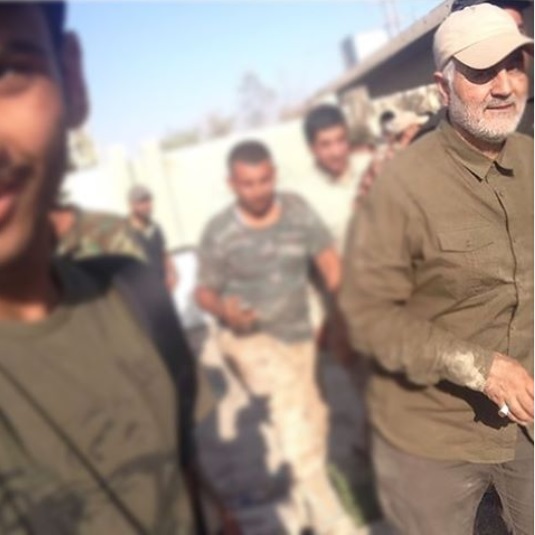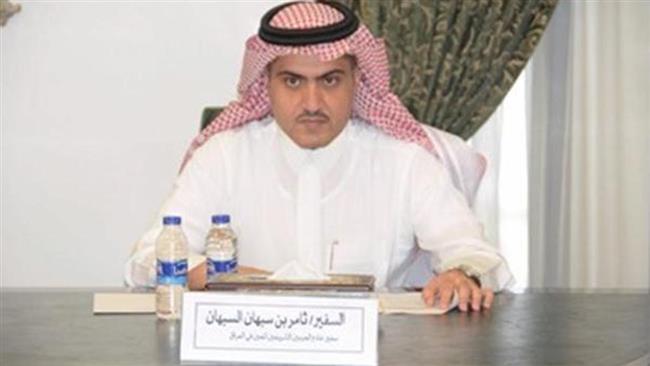Alwaght-Iraqi officials are becoming increasingly annoyed by the negative role played by the Saudi regime in the country, especially support for ISIS terrorists and opposition to Iran-Iraq ties.
In the latest pointer to Baghdad's displeasure, Iraq’s foreign minister Ibrahim al-Ja’afari has slammed Saudi ambassador's remarks about Iran’s role in the Arab country, including its advisory assistance to fight Takfiri terrorists.
Speaking to Iran's IRNA news agency on Saturday, al-Ja’afari pointed out that Saudi Ambassador Thamer al-Sabhan’s comments represent “flagrant meddling in Iraq's domestic affairs,” and run counter to standard diplomatic duties.
In a recent message posted on his Twitter account, Sabhan wrote that Iranian military advisers were in Fallujah to incite sectarian violence and change the demographic composition of the city.
The undiplomatic Saudi envoy made outburst after Iraqi forces liberated Fallujah from foreign-backed ISIS terrorists on Friday.
The Iraqi Foreign Ministry summoned Sabhan “to inform him of its official protest regarding his divisive statements.” The ministry said Baghdad would not allow anyone to provoke divisions in the country through sectarian statements.
Iraq has also rejected any Saudi attempts to draw it to its conflict with Iran.
Early June, an Iraqi MP Hanan al-Fatlawi asked the country’s Foreign Ministry to summon and warn the Saudi ambassador to Baghdad Tamer al-Sabhan over his undiplomatic behavior.
Al-Fatlawi demanded that the government to expels the Saudi diplomat if he does not abstain from violating the diplomatic norms.
The Iraqi Member of Parliament noted that al-Sabhan’s statements stir the seditions across the country whose entire segments and factions are confronting ISIS terrorist group.
Al-Sabhan earlier had tweeted that the Fallujah campaign aims at changing its demographic situation, claiming that "the existence of terrorist Iranian figures near the city indicates that they want to inflame the sectarian fire to burn the Arab Iraqis." The comments drew angry reactions among senior officials, who called for the Saudi envoy to be expelled.
This is not the first time the controversial Saudi ambassador has been summoned by the Iraqi Foreign ministry. In January this year, Iraq's foreign ministry summoned Sabhan to protest his "interference" in the country's internal affairs over remarks on militia forces fighting ISIS terrorist group. The foreign ministry summoned Sabhan "to inform him of its official protest regarding his media statements that represented interference in Iraqi internal affairs," it said in a statement.
A top commander serving at the Iraqi volunteer forces recently had warned of Saudi attempts to bring a large-scale operation for retaking the city of Fallujah to a halt in order to allow the ISIS terrorists to flee the city, now fully besieged by the Iraqi forces.
Abu Hashem Fanian al-Welayi, commander of Sayyid al-Shohada Battalions, a main wing of the Popular Mobilization Units or Hashid al-Shaabi, said reports suggest that Saudi Arabia’s ambassador to Iraq is trying to buy time for saving members of the ISIS terrorist group that were stuck in the beleaguered city of Fallujah.
Thamer al-Sabhan is the first Baghdad-based Saudi ambassador in a quarter century, but while full diplomatic relations are restored, there is still significant hostility to Riyadh in some quarters and there have already been calls for the envoy's expulsion.
Sources say that several members Ambassador Sabhan’s family are terrorists who were killed in Iraq and in Syria. His family has provided ISIS and al-Qaeda with several terrorists who either died or still fighting.
Moreover, Sabhan comes from a military background and he is not a diplomat per se. He comes from military/intelligence background and he was chosen basically to enhance Saudi undermining of the Iraqi state.
The Saudi envoy has openly declared his country's opposition to Iran's military advisors in Iraq while Baghdad says without the presence of the advisors, the country would have been overrun by ISIS Takfiri terrorists.
Recently, Abu Mahdi al-Muhandis, an Iraqi military commander who heads the Popular Mobilization Forces was quoted as saying, "Iran's General Qassem Soleimani is in Iraq following a request by the country's government and an advisor to the country's army.

Last month, Sayyid Hamid Husseini, a senior official of Iraq's Popular Mobilization Forces also known as al-Hashd al-Shaabi, reiterated on the important role played by Iran and General Soleimani in liberating large parts of the country from ISIS terrorists.
"We had been besieged and had lost everything but this brave commander (General Soleimani) came to assist us. I declare openly that, if the Islamic Republic of Iran and its Leader had not assisted us, today there would be nor Iraq," he added.
The Iraqi Popular Mobilization Forces, which works closely with Iranian military advisors, was formed in 2014 and is composed of citizens from different walks of life volunteering to defend their country.
Late May, Iran's Foreign Ministry issued a statement saying, “The presence of Iran’s military advisers in Iraq under the command of General Qassem Soleimani is at the request of the country’s legitimate government in order to fight terrorists and extremists who have beset Iraq and the region with instability and insecurity”.



























